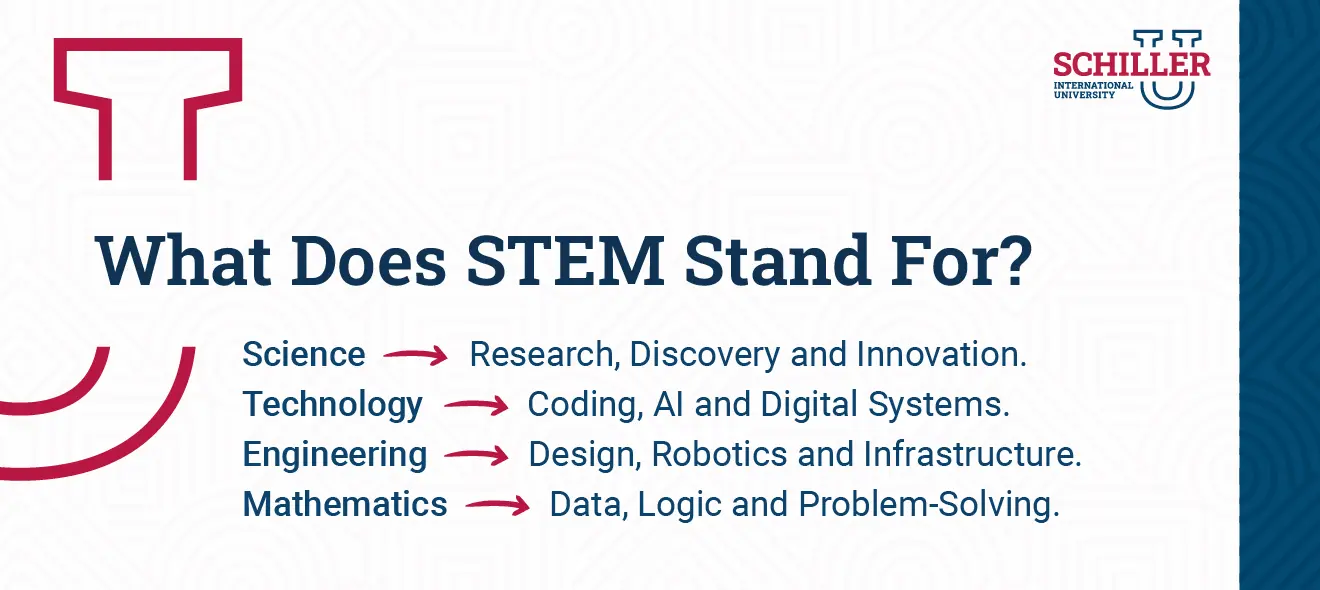STEM stands for Science, Technology, Engineering, and Mathematics. When broken down into its basic elements, a STEM degree is the study of hard sciences and technical fields. They usually require strong analytical, problem-solving, and data-driven skills. STEM degrees prepare you to design systems, work with data, and solve complex challenges that shape the real world. But here is where many students get confused. They often mix subjects such as business management, psychology, or environmental studies with STEM fields. Then, what is a STEM degree?
The reality is that only certain specializations with a strong science or technical focus fall under the STEM category. For example, business analytics might be STEM, but general management is not. Psychology with a neuroscience track might qualify, while traditional psychology might not. Knowing the difference is important, especially if you want to enroll in a STEM degree program. Let us learn more about it.

Importance of STEM Degree
The clarity of what a STEM degree is matters more today because the demand for STEM graduates has never been higher. It offers students a chance to develop technical and practical skills to stay relevant. These degrees are not just about science, technology, engineering, or mathematics in isolation. They are about learning to think critically, solve problems, and adapt to change. Here is why they are important now:
- Shaping the future of work: While many jobs are being automated, new ones are also being created. A STEM degree gives you the knowledge to understand, design, and work with the very technologies driving this change.
- Bridging industries: STEM graduates are not limited to laboratories or technology companies. They are needed in finance, healthcare, energy, logistics, sustainability, and even the creative industries, where data and digital tools play a growing role.
- Global demand: Employment for data scientists will grow by 33.5% between 2024 and 2034 (via US Bureau of Labor Statistics), while jobs in computer and information technology (IT) fields will also grow faster than average. This demand is not limited to the US; countries across Europe and Asia are also pushing for more STEM talent.
- Innovation and real-world impact: STEM education is practical and future-focused. It gives students the tools to design systems, build solutions, and tackle challenges such as climate change, cybersecurity, and global health.
For international students, the importance goes even further. A STEM degree offers not just technical expertise but also prepares them for careers that may not even exist yet, but they will define the future of work.
Why Choose a STEM Degree?
Deciding what to study will decide your academic and career trajectory. A STEM degree stands out because it prepares you for a career that adapts to change rather than fears it.
- Resilient career paths: Automation is replacing many jobs, but it is also creating new ones that require advanced technical and problem-solving skills. STEM graduates are positioned to step into these roles with confidence.
- Real-world impact: From developing sustainable energy systems to advancing medical technology, STEM fields allow you to work on projects that directly improve lives.
- Future-ready skills: Beyond technical know-how, STEM education sharpens adaptability, collaboration, and innovation. These are qualities employers across sectors are actively looking for in their new hires.
Choosing STEM is not only about securing a job. It is about shaping a career that grows with the world around you and keeps you relevant in the face of constant change.
Benefits of a STEM Degree
The benefits of a STEM degree go beyond what shows up on your resume. It is about the skills you build, the opportunities you can discover, and the flexibility you carry with you wherever you go.
- Problem-solving mindset: STEM education trains you to break down complex problems and design workable solutions. This is a skill set you can apply across industries.
- Career flexibility: Whether you start in data science, shift to sustainability, or move into artificial intelligence (AI) applications, STEM's analytical foundation makes it easier to transition between fields.
- Global demand: Employers in nearly every country are searching for STEM talent. It allows you more freedom to work across borders after graduation.
- Higher earning potential: STEM jobs are among the highest-paying fields. They offer stability and growth.
- Personal growth: Beyond technical knowledge, you will develop resilience, adaptability, and curiosity. These qualities will help you succeed in fast-changing environments.
The benefits of a STEM degree extend well beyond your first job. It will provide you with a lifelong toolkit for finding career paths in expected and unexpected fields.
STEM Degree Advantages for International Students
For international students, the benefits of earning a STEM degree extend beyond the classroom. An international STEM education experience provides you with the chance to gain technical expertise while immersing yourself in diverse cultures. They allow you to expand your worldview and prepare for careers that demand global readiness.
- Global exposure and mobility: Studying STEM in the US or Europe means experiencing different education systems, cultures, and professional landscapes. Schiller’s Intercampus Mobility Program even allows you to move between four international campuses, Tampa, Madrid, Paris, and Heidelberg, combining academic growth with cultural immersion.
- Career pathways through OPT: In the US, STEM graduates benefit from Optional Practical Training (OPT), which provides them with the opportunity to stay in the country for an additional year for work experience. STEM graduates also have the possibility to extend OPT for up to three years.
- International research and collaboration: STEM students often join projects and research initiatives that address global challenges, from climate change to data security. It will allow you to build skills that you can apply to real-world contexts.
- Networks that last a lifetime: Diverse classrooms bring together peers from around the world, offering not only collaboration in the moment but also connections that evolve into long-term professional and personal networks.
A STEM degree abroad will allow you to seek global opportunities, gain practical experience, and pursue careers that can take you anywhere.
Future of STEM Jobs
A STEM degree is your ticket to careers in some of the fastest growing and most impactful fields today. Employment in STEM fields is projected to increase at nearly three times the rate of non-STEM employment between 2023 and 2033, highlighting the growing demand for graduates with technical and analytical skills. Key career paths for STEM graduates include:
- Artificial intelligence and machine learning: Designing algorithms, predictive models, and intelligent systems for industries from finance to healthcare.
- Data science and analytics: Turning complex data into actionable insights for business strategy, research, and innovation.
- Cybersecurity: Protecting digital infrastructures in an increasingly interconnected world.
- Engineering and technology: Developing sustainable solutions, robotics, and new technologies across sectors.
- Sustainability and environmental management: Applying STEM knowledge to address global challenges like climate change and resource management.
For international students, STEM careers also come with global opportunities. Graduates can pursue roles in multinational corporations, startups, government agencies, or research institutions to gain practical work experience.
A STEM degree today is a way to prepare for a future shaped by technology, innovation, and global opportunities. While pursuing it comes with challenges, intensive coursework, adapting to new learning methods, and balancing work-study opportunities, the rewards are substantial: strong problem-solving skills, career flexibility, higher earning potential, and the chance to contribute to meaningful, real-world solutions.
At Schiller International University, you can combine STEM education with international mobility and access to diverse classrooms for a well-rounded foundation for success in a technology and knowledge-driven economy. Explore Schiller STEM programs at our Tampa, Madrid, Paris and Heidelberg campuses.
- MSc in Data Science
- BS in Computer Science
- BS in Applied Mathematics and Artificial Intelligence
- Master of Science in Sustainability Management
FAQs
Q1. What does STEM stand for, and why is it important for students today?
Answer: STEM stands for Science, Technology, Engineering, and Mathematics. These fields focus on analytical, technical, and problem-solving skills. STEM degrees are important today because AI, automation, and digital transformation are reshaping industries. They are creating high demand for graduates who can tackle complex, technology-driven challenges.
Q2. Which fields of study are included under STEM degrees?
Answer: STEM degrees cover disciplines in science, technology, engineering, and mathematics. Examples include data science, computer science, applied mathematics, AI, and engineering. These programs help students develop transferable practical skills and technical knowledge that can be applied across industries.
Q3. What career opportunities are available to graduates with a STEM degree?
Answer: STEM graduates can pursue roles in AI, cybersecurity, data science, engineering, finance, and IT, among others. STEM employment is projected to grow nearly three times faster than non-STEM jobs between 2023 and 2033, with opportunities in the private and public sectors worldwide.
Q4. Can international students pursue STEM programs in the United States and Europe?
Answer: Yes. With Schiller, international students can study STEM degrees in both the US and Europe. Our programs offer practical experiences, internships, and career pathways such as OPT in the US. You can also rotate between our international campuses for broader exposure.
Q5. What are the advantages of studying a STEM degree at a global university?
Answer: Studying STEM at a global university gives you mobility, exposure to diverse classrooms, global networking opportunities, and real-world learning experiences. It prepares you for careers across borders, strengthens problem-solving and analytical skills, and offers access to emerging fields like AI and data science.

 Request information
Request information









